#learning management system for Corporate
Explore tagged Tumblr posts
Text
Future-Proof Your Career: The Top 5 Skills in Demand for 2024
The workplace is a whirlwind of change. Technological advancements, shifting industry landscapes, and the lingering impact of the pandemic have created a need for a versatile and adaptable workforce. To navigate this dynamic environment, it's crucial to understand which skills will be in the highest demand in the coming years. Luckily, a new research report by Randstad sheds light on what workers themselves prioritize.
What Today's Workers Are Looking For
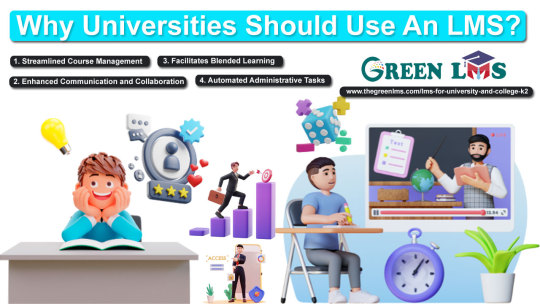
Randstad surveyed over 27,000 workers across 34 countries, revealing some key themes. The majority of participants (72%) expressed a strong desire for opportunities to learn new skills. Let's dive into the top five skills they identify as essential for a successful career in 2024 and beyond:
Technology Mastery: No surprise here. The most sought-after skills are tech-focused, particularly those involving artificial intelligence (AI) and IT. While you don't need to be a programmer, workers recognize that tech fluency and the ability to leverage emerging tools will be critical differentiators.
Adaptability & Resilience: In a world defined by uncertainty, the ability to embrace change, roll with the punches and learn from setbacks has become more valuable than ever. Workers seek environments that foster adaptability and provide the support needed to navigate evolving job requirements.
Data Fluency: Businesses generate vast amounts of data, but raw data tells little by itself. The ability to analyze, interpret, and translate data into actionable insights will be highly prized. Data literacy is essential for sound decision-making.
Creativity and Innovation: Automation is streamlining routine tasks, making uniquely human skills like creativity and problem-solving even more important. Employees want to engage in work that leverages their imaginations and allows them to develop innovative solutions.
Communication & Collaboration: Even as work becomes increasingly remote, strong communication skills remain paramount. The ability to articulate ideas clearly, work effectively in teams, and build relationships across departments and geographical locations is prized by workers.
How to Upskill
This list shouldn't be intimidating; see it as your blueprint for professional development. Here’s how to build these in-demand skills:
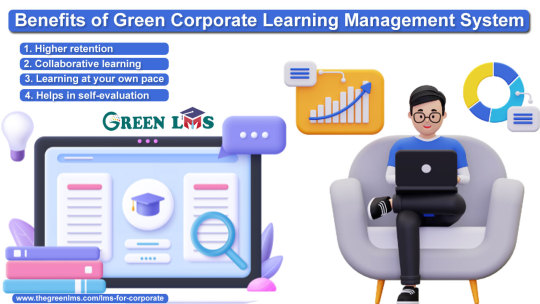
Online Courses: Platforms like Coursera, Udemy, and LinkedIn Learning offer a wealth of courses on everything from AI to data analysis and communication strategies.
Microcredentials: Short, focused certifications are a great way to demonstrate mastery of specific skills and quickly enhance your resume.
Mentorship: Seek out a mentor in your field who can share their knowledge and offer guidance as you develop new skills.
"Learning Sprints": Challenge yourself with concentrated learning bursts on a specific topic or skill. Set a timeline and leverage a variety of resources.
On-the-job Projects: Seek out opportunities within your current role to stretch yourself and apply new skills in a practical setting.
Important Note:
It's not just about acquiring these skills but also about demonstrating them clearly to potential employers. Ensure your resume highlights your continuous learning, and be prepared to discuss examples of how you've applied these skills with positive results.
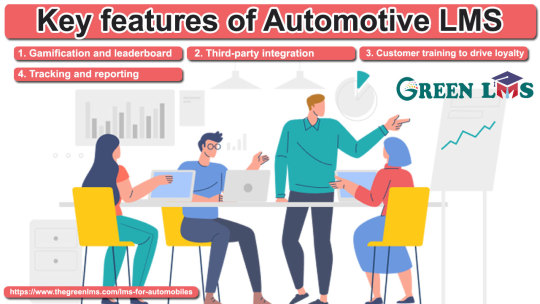
The Takeaway
The job market of 2024 (and beyond) will prioritize workers who have a thirst for learning, the ability to adapt to changing realities, and the technical and soft skills needed to thrive in a tech-driven environment. By investing in your own development, actively cultivating these in-demand skills, and showcasing your value, you'll put yourself in a position to achieve career success for years to come. Green LMS can be tailored for various applications, Higher education LMS, Schools LMS, Corporate LMS, and Business LMS. Whether you are looking to enhance student learning, improve employee skills, or develop leadership capabilities, Green LMS has the tools and features to support your organization's unique learning needs.
Let me know if you'd like any of these sections expanded or would like additional tips for upskilling!
#LMS#Learning Management Systems#LMS for corporate training#Corporate for LMS#Corporate learning management system#learning management system for Corporate#Corporate LMS#LMS for Schools K12#learning for School LMS#Best LMS for Business#Best LMS for Universities#Best LMS for Colleges#Best Business Learning Management Systems#Business Learning Management Systems#SME Best LMS for Business#Learning Management System for School#School Learning Management Systems
1 note
·
View note
Text
How AI and Gamification Are Transforming Online Learning in India
LMS platforms in India
In today’s fast-paced digital world, education and professional training must be engaging, personalized, and results-driven. That's why forward-thinking institutions and organizations are turning to advanced online learning management platforms that combine AI, gamification, and intuitive content design.
The new generation of LMS platforms in India is designed to address the evolving needs of modern learners. These platforms go beyond static content delivery. They empower learners with intelligent features, such as adaptive learning paths and real-time feedback mechanisms. At the forefront of this innovation are AI Coach LMS platforms in India, which personalize the learning experience by analyzing individual progress and offering tailored guidance.
Course creation has also evolved. Today’s eLearning course creation software enables trainers and educators to build interactive, multimedia-rich lessons quickly and efficiently. With tools like drag-and-drop editors, templates, and assessment modules, designing a course that keeps learners hooked is easier than ever.
Gamification is another element that’s reshaping digital learning. A robust LMS with gamification transforms passive content into an active experience. Features like leaderboards, points, and challenges keep learners motivated and increase course completion rates. It’s especially effective in both academic settings and corporate training environments.
Speaking of businesses, a reliable LMS for corporate training is crucial for onboarding, skill development, and compliance. Companies are increasingly using LMS platforms to scale their learning efforts and streamline internal processes. From performance tracking to automated certification, these tools save time while improving outcomes.
To support India’s diverse and geographically distributed workforce, online learning software platforms must also be mobile-ready and cloud-based. This ensures learners can access content anytime, anywhere—crucial in a country where digital adoption is growing across urban and rural areas alike.
One platform that delivers on all these fronts is Skolasti, offering a complete LMS solution with built-in AI coaching, gamification, course creation, and reporting tools. Whether you're an educator or a corporate trainer, Skolasti helps simplify and scale your learning programs.
As India’s digital learning landscape matures, it’s clear that AI, gamification, and flexibility are not just trends—they’re essentials. And with the right platform, every learner can succeed.
#Best LMS for Corporate Training#Affordable Learning Management System for Small Businesses#Easy Course Creation Tools for Educators#LMS with Gamification Features#Personalized Learning Paths for Corporate Teams#Real-time Learner Progress Tracking LMS#Online Training Platform with Quizzes and Webinars#LMS with Adaptive Assessments#Best LMS for Remote Team Training#LMS with Badges and Leaderboards
0 notes
Text
Corporate Training in Mumbai: How LMS and Emerging Technologies Are Shaping Learning Trends
In the bustling business hub of Mumbai, corporate training has evolved significantly to keep pace with the rapidly changing market dynamics. One of the most compelling shifts in this landscape is the adoption of LMS Learning Management Systems and emerging technologies, which are transforming traditional training methods into more dynamic, engaging, and effective experiences for employees.
The rise of LMS solutions is a game-changer for businesses in Mumbai. An LMS is a software application that enables the administration, documentation, tracking, and delivery of educational courses or training programs. This system allows organizations to streamline their training processes, making it easier to manage corporate training programs and track employee progress. By integrating an LMS, companies gain access to a centralized platform that hosts training materials, collects feedback, and analyzes performance metrics, thus enhancing the efficiency of the training process.
One of the key advantages of implementing an LMS in corporate training is the flexibility it offers. Employees can access learning modules at their convenience, accommodating different schedules and learning paces. This self-paced learning environment caters to diverse employee needs, making corporate training more inclusive. Moreover, companies can easily update the content of their courses, ensuring that employees always have access to the most current information and skills relevant to their roles.
Emerging technologies are also playing a crucial role in shaping the future of corporate training in Mumbai. Virtual reality (VR) and augmented reality (AR) are becoming increasingly popular, allowing for immersive learning experiences that can simulate real-world scenarios. For instance, training employees in safety protocols using VR can provide a risk-free environment for them to practice and engage with the material. This not only enhances retention but also boosts confidence, allowing employees to perform better in their roles.
Furthermore, artificial intelligence (AI) is being integrated into LMS platforms to personalize learning experiences. AI can analyze user data to recommend training modules tailored to an individual's specific needs, enhancing engagement and effectiveness. This personalization increases retention rates, making training more effective in delivering desired outcomes.
The corporate training landscape is further enriched by mobile learning solutions. With the rise of remote work arrangements and an increasingly mobile workforce, training accessed via smartphones and tablets allows learners to engage with content anytime, anywhere. This mobility not only improves engagement but also ensures that employees are continuously learning and developing their skills even while on the go.
In Mumbai, numerous corporate training solutions are available that harness the power of LMS and emerging technologies. These solutions cater to a wide array of industries and training needs, providing businesses with the flexibility to choose programs that align with their strategic goals. Companies looking to optimize their training investments can benefit from the expertise offered by top corporate training solutions in Mumbai, which provide tailored workshops, seminars, and e-learning courses.
As organizations continue to navigate the complexities of the modern workforce, the synergy between LMS and cutting-edge technologies promises to redefine corporate training. By embracing these innovations, businesses in Mumbai can ensure that their employees are well-equipped to meet the challenges of today's fast-paced environment, driving performance and fostering a culture of continuous learning. The future of corporate training looks promising, and those who adapt will undoubtedly lead the way in their respective fields.
#leadership training#manager training#sales training#training#education#it training#it#corporate#corporate training#digital transformation#LMS#learning management system
0 notes
Text
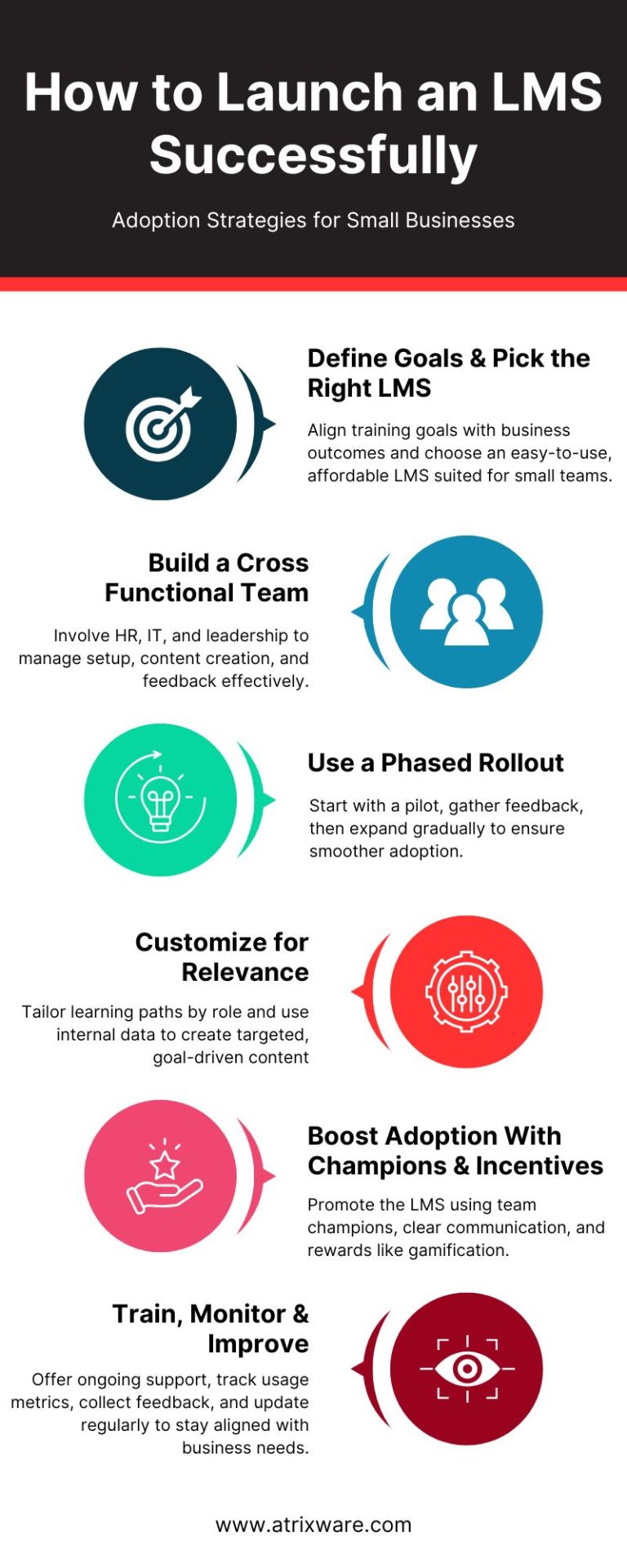
How to Launch an LMS Successfully- Adoption Strategies for Small Businesses
Explore how small businesses can implement an LMS successfully using adoption methods that increase user participation, learning impact, and team growth.
#lms for small companies#learning management system for small business#launching an LMS#how to launch an LMS successfully#employee training systems#corporate learning management systems#best lms for small business
0 notes
Text
NIIT MTS Acquires Germany based MST Group to Strengthen European Learning Services Footprint
NIIT Learning Systems Limited (NIIT MTS), through its wholly owned subsidiary NIIT (Ireland) Limited, has successfully completed the acquisition of 100% equity shareholding in MST Investment Holding GmbH, Germany, along with its subsidiaries, collectively known as the MST Group. The total deal size is valued at EUR 22.37 million, which includes EUR 15.35 million for the equity acquisition and an…

View On WordPress
#automotive training sector#business growth strategy#corporate learning solutions#corporate training europe#dach region#edtech investments#europe mna 2025#european edtech market#german business deal#germany learning market#global corporate training#industrial sector learning#l&d transformation#learning and development#managed learning services#mna news#mst group acquisition#multilingual training services#niit acquisition#niit business update#niit demerger#niit demerger date#niit demerger news#niit europe strategy#niit germany deal#niit growth plan#niit international expansion#niit learning outsourcing market#niit learning share price#niit learning systems acquisitions
0 notes
Text
Cloud Based LMS Systems Powering the Future of Education. As education continues to evolve in the digital age, schools, universities, and training institutes are turning to cloud based LMS systems to deliver flexible, interactive, and scalable learning experiences. With more institutions embracing hybrid and remote learning, a cloud based learning management system offers the ideal infrastructure to support future-ready education.
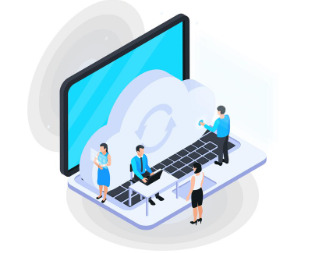
What Is a Cloud Based Learning Management System?
A cloud based learning management system is an online platform that allows educators to create, manage, and deliver courses without needing physical servers or complex hardware. Accessible from anywhere, these systems support:
Online classrooms
Assignments and grading
Video lectures and resources
Real-time communication
Analytics and reporting
They work on a Software-as-a-Service (SaaS) model, enabling users to access data securely on-demand.
Why Cloud Based LMS Systems Are Reshaping Education
FeatureBenefit to Educators and Learners24/7 Access to LearningStudy anytime, anywhereDevice CompatibilityWorks on smartphones, tablets, laptopsAutomatic UpdatesAlways up-to-date featuresCost EfficiencyNo physical infrastructure neededSecure Data StorageCloud encryption and backups
These benefits make cloud based LMS systems a go-to solution for both traditional institutions and new-age edtech platforms.
Key Advantages of Cloud Based LMS Systems
1. Scalability
Whether you're teaching 10 students or 10,000, the system scales effortlessly without additional hardware.
2. Centralized Content Management
Instructors can store, edit, and distribute materials from a single interface, reducing duplication and errors.
3. Personalized Learning Paths
Adaptive learning modules allow for customization based on student performance and preferences.
4. Collaboration & Communication
Built-in tools like discussion boards, live chat, and peer review features enhance interactivity.
5. Analytics & Feedback
Real-time reports help educators monitor progress and adapt teaching methods accordingly.
Educator Testimonials
"We transitioned to a cloud based learning management system last year and haven’t looked back. It’s flexible, secure, and supports every part of our curriculum." — Principal, International School, Bangalore
"The analytics dashboard in our cloud based LMS system helped us identify students needing support early. It’s changed how we intervene and support learners." — Academic Coordinator, Higher Education Institute

Frequently Asked Questions (FAQ)
Q1: How is a cloud based LMS different from a traditional one? A: Traditional LMS systems require local servers and manual updates. Cloud LMS platforms are hosted online, automatically updated, and accessible from anywhere.
Q2: Is cloud storage safe for student data? A: Yes. Reputable LMS providers use encrypted data centers with GDPR and FERPA compliance.
Q3: Do teachers need special training to use it? A: Basic training helps, but most platforms are intuitive with built-in tutorials and support.
Q4: Can a cloud LMS integrate with video conferencing tools? A: Absolutely. Most platforms support Zoom, Google Meet, and Microsoft Teams.
Q5: Is it affordable for small schools or coaching centers? A: Yes. Many providers offer flexible pricing based on the number of users or features needed.
Conclusion
The shift toward digital learning is no longer a trend — it’s a necessity. Cloud based LMS systems are not only shaping the present of education but also paving the way for a more accessible, data-driven, and learner-focused future. With tools that adapt, scale, and connect, a cloud based learning management system is the foundation every institution needs to stay ahead in the 21st century classroom.
0 notes
Text

From Office-Centric Roots to Human-Centric Realities: The Evolution of Learning and Development
The COVID-19 pandemic didn’t just disrupt workplaces, it disrupted decades of convention. Commercial buildings emptied, face-to-face interactions vanished and training rooms gathered dust. Learning and Development (L&D) professionals found themselves asking: How do we continue to build skills, foster growth, and engage learners—without the office? In this piece we look at whats been the permanent damage or rather the influence of Covid…of course we are talking the health of corporate learning…
0 notes
Text
How do AI-Powered Applicant Tracking Systems Help Build Stronger Talent Pools?
AI-powered Applicant Tracking Systems (ATS) transform recruitment by centralizing candidate data, automating engagement, and leveraging AI to keep a pipeline of qualified prospects ready for new roles. By treating candidates as long-term assets rather than one-off applicants, ATS enables recruiters to fill positions faster, reduce sourcing costs, and improve hire quality. In this article, we’ll explore:
What a talent pool is and why it matters
Five ways ATS builds and maintains talent pools
Additional ATS features that enhance pipeline strength
Real-world statistics and case examples
Best practices for maximizing ATS-driven talent pools
What Is a Talent Pool and Why Does It Matter
A talent pool is a categorized group of potential candidates—active and passive—who have demonstrated interest or match your organization’s hiring criteria. Rather than starting sourcing from scratch for each vacancy, recruiters tap into this pre-qualified database to accelerate hiring and reduce costs. Talent pools often include:
Active applicants who applied for previous roles
Passive candidates identified via sourcing tools
Alumni and past employees
Referrals and networking contacts
Strong talent pools lead to faster time-to-fill, lower acquisition costs, and better cultural fits by enabling continuous engagement and data-driven selection.
1. Centralized Candidate Database
ATS automatically ingests resumes and application data from career sites, job boards, email, and referral sources into a single, searchable database. This centralization:
Eliminates data silos—no more spreadsheets scattered across teams.
Enables keyword and skills searches across all historical applicants.
Surfaces “silver medalists”—candidates who narrowly missed previous roles yet remain strong fits.
With all candidate records in one place, recruiters can quickly mine past applicants before launching new sourcing campaigns, reducing redundant efforts by up to 30%.
2. Automated Candidate Engagement
Maintaining candidate interest over time is critical to keeping talent pools warm. AI-powered ATS includes email automation, SMS alerts, and chatbot interfaces to:
Send personalized job alerts when new positions match a candidate’s profile.
Trigger drip campaigns—e.g., newsletter invitations, company updates—to nurture passive prospects.
Provide real-time status updates on applications to enhance the candidate experience.
Automated engagement workflows ensure timely communication at scale, boosting re-engagement rates by as much as 45% compared to one-off outreach.
3. CRM-Style Nurturing and Segmentation
Top ATS platforms function like candidate relationship management (CRM) systems, offering:
Segmentation: Tag and group candidates by skill sets, locations, or roles.
Drip campaigns: Tailor outreach—webinars for engineers, events for sales pros.
Event tracking: Monitor candidate interactions (email opens, link clicks) to gauge interest.
This CRM-style approach treats talent pools as ongoing communities, not one-time transactions. By segmenting and delivering targeted content, recruiters deepen relationships, driving a 25% increase in engagement over generic mass emails.
4. AI-Driven Matching & Predictive Analytics
Advanced ATS leverages machine learning to analyze historical hiring data and score pool candidates based on:
Skills and experience match the new job requisitions
Likelihood to succeed, learned from past performance metrics
Cultural alignment, inferred from language patterns and assessments
Predictive analytics forecast future hiring needs—e.g., seasonal spikes in customer-support hiring—so recruiters can proactively expand relevant segments. AI-powered matching surfaces top prospects instantly, cutting screening time by up to 70%.
5. Data-Driven Pipeline Health Monitoring
Integrated dashboards in ATS provide real-time visibility into talent-pool metrics, such as:
Pipeline volume: Number of candidates per role or segment
Conversion rates: From pool to interview, interview to offer
Source effectiveness: Which channels contributed to the top-performing candidates
By tracking these KPIs, recruiting teams identify bottlenecks (e.g., low conversion in the “engineers” pool) and adjust tactics—launching targeted campaigns or refining sourcing filters—to maintain a healthy pipeline.
Additional ATS Features to Strengthen Talent Pools
Career-Site Integration
Embedding ATS job feeds and application forms on your career site ensures that every applicant enters the talent-pool database seamlessly, reducing drop-off from external redirects.
Job Distribution Automation
Automated multi-board postings—from LinkedIn to niche forums—keep talent pools fresh by attracting both active and passive candidates without manual posting work.
Assessment & Video-Interview Integrations
Linking assessment platforms and one-way video tools enriches candidate profiles with performance data, enabling recruiters to nurture only high-potential prospects in critical skill areas.
Background Check Workflows
Automated triggering of background and reference checks when candidates meet pool criteria ensures compliance and speeds time-to-hire for pre-screened talent.
Real-World Impact & Statistics
50% faster sourcing: Companies using ATS-driven talent pools report halving their time-to-fill for repeat roles.
20–30% lower acquisition costs: Reusing pre-qualified pool candidates reduces reliance on expensive external agencies.
15% higher quality-of-hire: AI-matched candidates from talent pools consistently outperform cold-sourced applicants.
45% increased candidate engagement: Automated nurturing drives stronger response rates compared to ad hoc outreach.
Best Practices for ATS-Driven Talent Pools
Define Clear Segments Establish pool categories by role, skill, or geography to focus nurturing efforts and content.
Automate Smart WorkflowsUse trigger-based campaigns (e.g., event follow-ups) to keep engagement high without manual effort.
Maintain Data Hygiene Regularly archive inactive profiles and solicit updates from stale contacts to keep pool data current and GDPR-compliant.
Combine AI with Human Touch Leverage AI for screening, but personalize final outreach and interviews to assess soft skills and cultural fit.
Monitor & Iterate Review pipeline health dashboards monthly, adjusting segments, messaging, and sourcing channels based on performance.
Conclusion
Applicant Tracking Systems do far more than process one-off applications—they empower recruiters to build, nurture, and leverage strategic talent pools. By centralizing candidate data, automating engagement, applying CRM principles, and harnessing AI for predictive matching, organizations can:
Fill roles faster
Reduce sourcing costs
Strengthen the employer brand
Improve the quality of hires
Implementing best practices around segmentation, automation, and data governance ensures your AI-powered ATS-driven talent pools become a sustainable competitive advantage in today’s talent-driven market.
#applicant tracking system for small business#ats hr software#corporate learning management systems#applicant tracking systems ats#ats tracking system#ats software solutions#best applicant tracking systems#top applicant tracking software#ats software#best ats systems
0 notes
Text
An LMS for corporates streamlines employee training, boosts productivity, and ensures consistent learning across teams. It simplifies content delivery, tracks progress, and supports compliance—making it essential for modern businesses aiming to stay competitive and foster continuous development.
0 notes
Text

Features of the best LMS for corporate
LMS for corporate provides anytime and anywhere access so that employees can opt for training courses at their own pace, and they don’t have to worry about coordinating time and dates like face-to-face training. Flexibility and accessibility enable a trainee to view the activity on demand, as per their requirement. In addition, it also allows them to revisit the lesions and courses in case they face challenges. https://www.thegreenlms.com/corporate-lms/
Flexibility in training
Ability to Integrate
eCommerce
Corporate and Brand Identity
#LMS#Learning Management Systems#LMS for Schools K12#learning for Schoo lLMS#Best LMS for Business#Best LMS for Universities#Best LMS for Colleges#LMS for corporate training#Corporate for LMS#Corporate learning management system#learning management system for Corporate#Corporate LMS#LMS for Schools#LMS for Business#LMS for University#LMS for Colleges#LMS for Corporate#best LMS for schools
1 note
·
View note
Text
Revolutionizing Education in India: AI Coach LMS, Gamification, and eLearning Tools
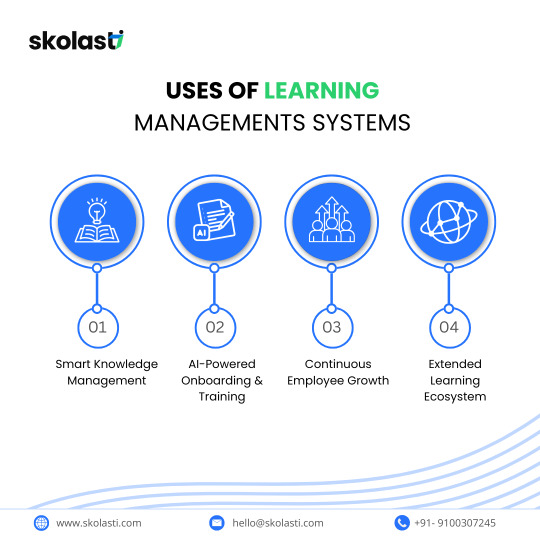
The Indian education and corporate training sectors are undergoing a digital transformation, fueled by innovations in technology. Among the most impactful developments are AI Coach LMS platforms in India, the increasing use of eLearning course creation software, and the growing popularity of LMS with gamification features. These tools are making learning more personalized, engaging, and results-driven.
AI Coach LMS Platforms in India: Smarter Learning for a Smarter Nation Artificial Intelligence is changing the way we learn. AI Coach LMS platforms in India are leading this transformation by offering smart, adaptive learning experiences. These platforms can analyze user behavior, recommend content based on learning pace and preferences, and even provide real-time feedback.
This level of personalization is especially valuable in India’s diverse learning environment, where students and professionals have different learning speeds, goals, and language needs. AI coaches help bridge these gaps by providing 24/7 assistance, performance tracking, and skill development insights.
LMS Platforms in India: A Rapidly Expanding Market India is one of the fastest-growing markets for digital learning. With increased internet access and smartphone usage, LMS platforms in India have become a vital part of educational institutions, coaching centers, and corporate training teams.
These platforms offer features such as mobile learning, live classes, content management, quizzes, certificates, and integration with third-party tools. Many Indian LMS providers now offer region-specific features like vernacular language support and low-data usage modes to reach rural learners.
eLearning Course Creation Software: Building Engaging Digital Content Creating quality learning content is now easier than ever with modern eLearning course creation software. These platforms empower educators, trainers, and subject matter experts to design visually appealing, interactive, and multimedia-rich content without needing advanced technical skills.
In India, this is helping businesses scale employee training programs and enabling teachers to deliver better remote education. The best course creation tools offer templates, animation features, assessments, and compatibility with SCORM or xAPI, making integration with LMS platforms seamless.
LMS with Gamification: Learning Through Play Traditional learning models can sometimes feel dry or repetitive, especially in digital formats. That’s why LMS with gamification is gaining popularity. By turning lessons into interactive experiences using points, badges, levels, and leaderboards, learners stay more motivated and focused.
Gamified LMS platforms are particularly effective in India’s K-12 education space and corporate learning sector. They promote healthy competition, increase course completion rates, and enhance long-term knowledge retention.
Gamification in LMS: A Strategic Advantage Implementing gamification in LMS isn’t just about fun — it’s a powerful strategy to drive learner engagement and performance. It encourages consistent participation, provides instant feedback, and makes progress visible.
In the Indian context, companies are using gamification to improve onboarding, customer service training, and soft skill development. Educational institutions are integrating it to keep students engaged in online classrooms and tutoring platforms.
Conclusion The combination of AI Coach LMS platforms in India advanced eLearning course creation software, and gamification in LMS is shaping the future of learning. These tools are helping learners across the country gain access to high-quality education, regardless of their location or background.
As India continues to embrace digital transformation, investing in smart LMS platforms and engaging learning content will be key to building a skilled and future-ready workforce.
#AI Coach LMS platforms in India#LMS platforms in India#eLearning course creation software#LMS with gamification#gamification in LMS#online learning software platforms#LMS for corporate training#learning management system#online learning management platforms
0 notes
Text
#Learning Management Systems#Off-the-Shelf LMS#Moodle#TalentLMS#Docebo#SAP Litmos#Adobe Captivate Prime#Canvas by Instructure#Corporate Training#E-Learning Solutions
0 notes
Text

How to Measure Your LMS ROI Metrics: Dashboards and Benchmarks for SMBs
Discover how SMBs can track LMS ROI using performance dashboards, benchmarks, and KPIs to evaluate training effectiveness and enhance business value.
#lms for small companies & small business lms#small business lms#best lms for small companies#lms for small companies#learning management system for small companies#lms systems for small companies#employee training systems#corporate learning management systems
0 notes
Text
Benefits of Best LMS for Business in 2025
In today’s fast-paced corporate world, businesses are increasingly turning to Learning Management Systems (LMS) to streamline employee training, enhance professional development, and improve overall organizational performance. But with so many options available, how do you choose the best LMS for business?
This comprehensive guide will walk you through the top features, benefits, and considerations to help you identify the ideal LMS for your organization. We’ll also answer some frequently asked questions to address common concerns and help you make an informed decision.
What Is an LMS?
A Learning Management System (LMS) is a software platform designed to deliver, manage, and track training programs and learning content. Businesses use LMS solutions for various purposes, including onboarding, compliance training, skill development, and performance management.
Key Features to Look for in the Best LMS for Business

User-Friendly Interface An intuitive and easy-to-navigate platform ensures both administrators and learners can use the system efficiently without extensive training.
Customizable Learning Paths Look for an LMS that allows you to tailor courses and training paths to meet specific business needs and employee goals.
Integration Capabilities Ensure the LMS integrates seamlessly with your existing tools, such as HR software, CRM platforms, and productivity tools.
Mobile Accessibility A mobile-friendly LMS enables employees to access training materials anytime, anywhere, enhancing flexibility and engagement.
Robust Analytics and Reporting Detailed reporting tools allow you to measure the effectiveness of training programs and make data-driven decisions.
Gamification Incorporating gamified elements like badges, leaderboards, and rewards can boost engagement and motivation among learners.
Scalability As your business grows, your LMS should be able to accommodate additional users, courses, and functionalities.
Benefits of Using an LMS for Business
1. Improved Employee Performance
An LMS provides employees with access to relevant training materials, helping them acquire the skills needed to perform their roles effectively.
2. Cost-Effective Training
Digital training eliminates the need for physical classrooms, printed materials, and travel expenses, reducing overall training costs.
3. Enhanced Compliance
An LMS helps businesses stay compliant by tracking mandatory training requirements and certifications.
4. Increased Employee Engagement
Interactive and engaging training programs can boost employee satisfaction and retention.
5. Centralized Learning
An LMS serves as a centralized hub for all training materials, making it easier to manage and distribute content.
Top LMS Platforms for Businesses in 2025
1. Docebo
Known for its AI-powered features, Docebo offers robust tools for course creation, performance tracking, and learner engagement.
2. TalentLMS
This cloud-based LMS is ideal for small to medium-sized businesses, offering easy customization and scalability.
3. SAP Litmos
A popular choice for large enterprises, SAP Litmos provides advanced analytics, compliance tracking, and mobile learning capabilities.
4. Moodle
As an open-source LMS, Moodle allows businesses to customize the platform to suit their specific needs.
5. Absorb LMS
Absorb LMS stands out for its intuitive interface, mobile-first design, and extensive reporting tools.
How to Choose the Best LMS for Your Business
Identify Your Goals Determine the primary purpose of implementing an LMS, such as improving onboarding, ensuring compliance, or upskilling employees.
Evaluate Your Budget Understand the total cost of ownership, including setup fees, licensing, and maintenance costs.
Request Demos Test multiple platforms through free trials or demos to assess usability and features.
Seek Feedback Involve your team in the decision-making process to ensure the chosen LMS meets their needs.
Consider Vendor Support Reliable customer support and training resources are essential for a smooth implementation process.
FAQs About the Best LMS for Business
Q1: What is the cost of implementing an LMS?
The cost varies depending on the platform, features, and number of users. SaaS-based LMS solutions typically charge a monthly or annual subscription fee.
Q2: Can an LMS be used for remote training?
Yes, most modern LMS platforms are designed for remote learning, offering mobile accessibility and cloud-based features.
Q3: How long does it take to implement an LMS?
Implementation timelines vary based on the complexity of the system and the size of your organization. It can take anywhere from a few weeks to several months.
Q4: Can small businesses benefit from an LMS?
Absolutely! LMS platforms like TalentLMS and Moodle are cost-effective and scalable, making them ideal for small businesses.
Q5: Is data security a concern with LMS platforms?
Reputable LMS providers implement robust security measures, including data encryption, access controls, and regular audits, to ensure data protection.
Conclusion
Selecting the best LMS for business is a critical step toward achieving your training and development goals. By considering your organization’s specific needs and thoroughly evaluating available options, you can find a solution that enhances productivity, reduces costs, and fosters a culture of continuous learning.
Start your journey today and empower your workforce with the right LMS platform!
#Best LMS for Business#learning management system examples#canvas lms#talent lms#best corporate learning management systems#lms for corporate training#free lms for business
0 notes
Text
Learning Management Systems (LMS): Revolutionizing Education and Training
Learning Management Systems (LMS) are transforming the way education and training are delivered in both academic and corporate settings. An LMS provides a centralized platform for creating, managing, and delivering online courses, enabling institutions and organizations to offer flexible, accessible, and personalized learning experiences. From tracking student progress and assessments to hosting interactive content and facilitating collaboration, LMS platforms streamline the entire learning process. They have become essential tools for e-learning, remote education, and employee training, helping learners and educators connect and engage more effectively in today’s digital world.
More info: https://ahalts.com/products/total-workforce-management
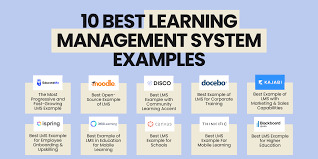
#Learning Management Systems#LMS#Online learning platforms#E-learning#Remote education#Corporate training#LMS benefits#Digital education
0 notes
Text
Best Online corporate learning management system
Discover the best online corporate learning management systems designed to streamline employee training, boost engagement, and enhance workforce development with cutting-edge e-learning solutions.
0 notes